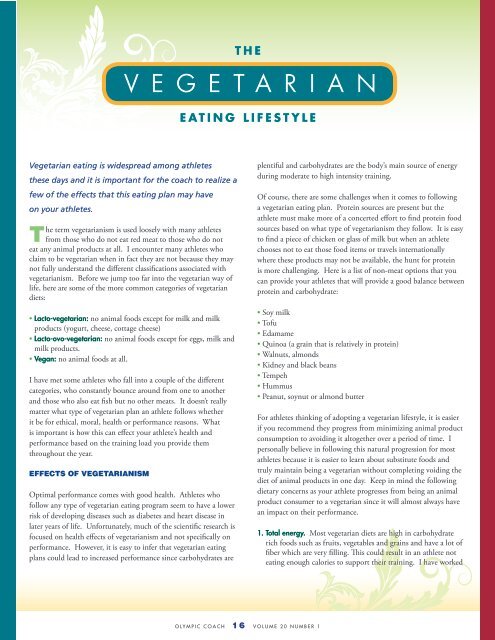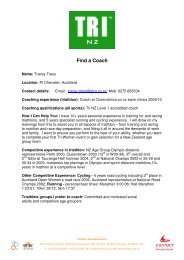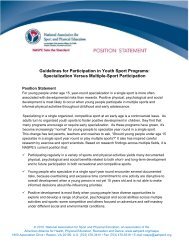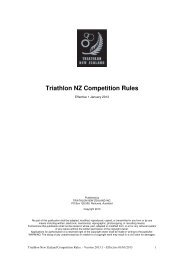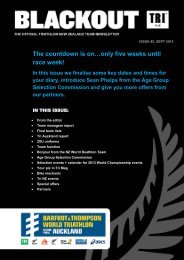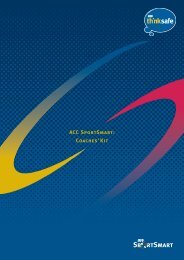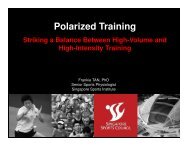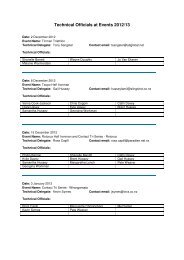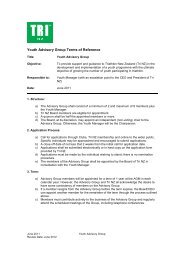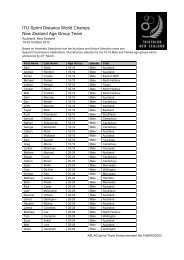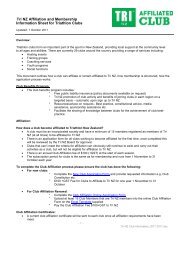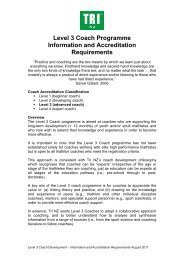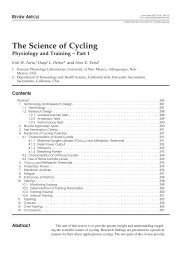Cycling Your Periodization - United States Olympic Committee
Cycling Your Periodization - United States Olympic Committee
Cycling Your Periodization - United States Olympic Committee
Create successful ePaper yourself
Turn your PDF publications into a flip-book with our unique Google optimized e-Paper software.
T H EV E G E T A R I A NE A T I N G L I F E S T Y L EVegetarian eating is widespread among athletesthese days and it is important for the coach to realize afew of the effects that this eating plan may haveon your athletes.The term vegetarianism is used loosely with many athletesfrom those who do not eat red meat to those who do noteat any animal products at all. I encounter many athletes whoclaim to be vegetarian when in fact they are not because they maynot fully understand the different classifications associated withvegetarianism. Before we jump too far into the vegetarian way oflife, here are some of the more common categories of vegetariandiets:• Lacto-vegetarian: no animal foods except for milk and milkproducts (yogurt, cheese, cottage cheese)• Lacto-ovo-vegetarian: no animal foods except for eggs, milk andmilk products.• Vegan: no animal foods at all.I have met some athletes who fall into a couple of the differentcategories, who constantly bounce around from one to anotherand those who also eat fish but no other meats. It doesn’t reallymatter what type of vegetarian plan an athlete follows whetherit be for ethical, moral, health or performance reasons. Whatis important is how this can effect your athlete’s health andperformance based on the training load you provide themthroughout the year.Effects of VegetarianismOptimal performance comes with good health. Athletes whofollow any type of vegetarian eating program seem to have a lowerrisk of developing diseases such as diabetes and heart disease inlater years of life. Unfortunately, much of the scientific research isfocused on health effects of vegetarianism and not specifically onperformance. However, it is easy to infer that vegetarian eatingplans could lead to increased performance since carbohydrates areplentiful and carbohydrates are the body’s main source of energyduring moderate to high intensity training.Of course, there are some challenges when it comes to followinga vegetarian eating plan. Protein sources are present but theathlete must make more of a concerted effort to find protein foodsources based on what type of vegetarianism they follow. It is easyto find a piece of chicken or glass of milk but when an athletechooses not to eat those food items or travels internationallywhere these products may not be available, the hunt for proteinis more challenging. Here is a list of non-meat options that youcan provide your athletes that will provide a good balance betweenprotein and carbohydrate:• Soy milk• Tofu• Edamame• Quinoa (a grain that is relatively in protein)• Walnuts, almonds• Kidney and black beans• Tempeh• Hummus• Peanut, soynut or almond butterFor athletes thinking of adopting a vegetarian lifestyle, it is easierif you recommend they progress from minimizing animal productconsumption to avoiding it altogether over a period of time. Ipersonally believe in following this natural progression for mostathletes because it is easier to learn about substitute foods andtruly maintain being a vegetarian without completing voiding thediet of animal products in one day. Keep in mind the followingdietary concerns as your athlete progresses from being an animalproduct consumer to a vegetarian since it will almost always havean impact on their performance.1. Total energy. Most vegetarian diets are high in carbohydraterich foods such as fruits, vegetables and grains and have a lot offiber which are very filling. This could result in an athlete noteating enough calories to support their training. I have workedO L Y M P I C C O A C H 1 6 V O L U M E 2 0 N U M B E R 1


